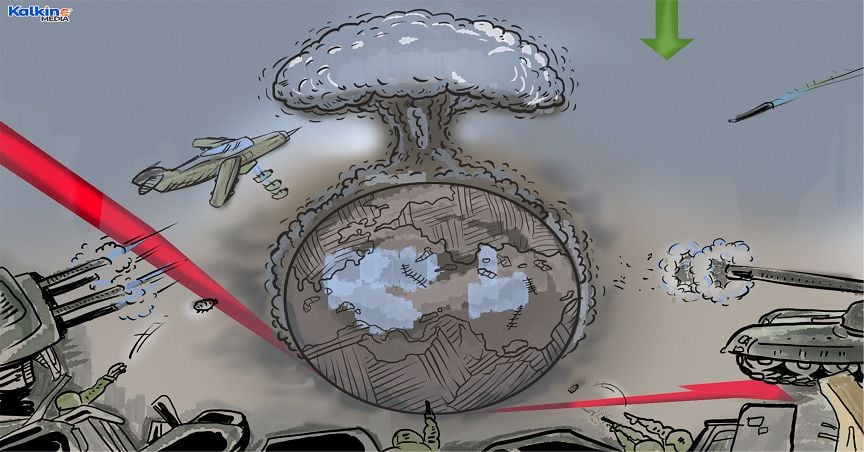Highlights
- The escalating geopolitical tensions seem to be risking the global economy’s recovery from the pandemic.
- The war has highlighted the nations’ increased dependence on exports of food items and raw materials.
- Many car component manufacturers have their operations set up in Ukraine, which have become largely ineffective.
The Russia-Ukraine war has sent shockwaves even to nations geographically isolated from the two battling countries. Meanwhile, the escalating political tensions between Russia and Ukraine have aggravated policymakers’ concerns, threatening the world economy’s recovery from the pandemic. What has resulted from this altercation is an added risk to an already battered global economy.
Also Read: Russia-Ukraine war: What is going inside President Putin's mind?
Since the beginning of the conflict, leaders across the globe have been highlighting that the economic impacts of the war could be catastrophic. Russia and Ukraine’s combined stance as global suppliers of critical raw materials is the prime reason why the effect of their political dispute has surpassed borders.
Soaring prices, dearth of good quality raw materials and tanking stock markets are some of the hard-hitting realities facing countries in the current economic climate. While Western countries are imposing sanctions against Russia to prevent the war, the average consumer is expected to bear the brunt of these actions.
Overall, the global economy seems to be shaping a cloudy outlook from its previously recovering state. In a way, the Russia-Ukraine war is no longer just a conflict of political opinion but could go down in history as one of the toughest tests facing the global economy in the 2020s.
Supply chain constraints
Despite most countries observing a controlled number of virus infections, the aftereffects of the pandemic are lingering. While medical concerns have diminished with time, the economic ill-effects continue to be felt globally. Most notable are the global supply-chain pressures that surfaced slightly after the delta variant outbreak and are still a pressing issue for producers.
Related Read: Will global supply chain woes end soon?
The supply-related challenges have become increasingly evident in the past few months, highlighting the pre-existing issues that have plagued global economies for years. Additionally, the war in Ukraine has underlined the countries’ increasing dependence on exports of food items and raw materials.
While integrating foreign products into the domestic economy is largely viewed as an efficient way to conduct business, it has some tricky aspects attached to it. These aspects have become more pronounced due to the ongoing global shocks.

The major implications of the ongoing war to the supply-chain ecosystem are expected to be quite harsh, especially in Russia and Ukraine. Although shipment delays and soaring costs of raw materials have become persisting events, these problems may not find a solution anytime soon. Most importantly, dampened food supplies from Ukraine and Russia could lead to diminishing food security and an overall handicapped supply-chain structure for essential food grains.
Industry-wide impacts
The present circumstances have shown that electric vehicles have no better time to disrupt the automobile markets than now. Soaring fuel prices have exhibited the economic power that lies in the hands of oil-producing nations like Russia. Sanctions have had a little short-term impact in curtailing the Russian troops’ ongoing actions.
Do Not Miss: Crude oil dips on possible Russia-Ukraine negotiation talks
Alternatively, soaring gas and fuel prices have become a painful side-effect of aggressive sanctioning against Russia. But for the automobile industry, rising fuel prices are only a part of the problem as the war could potentially hurt the sector in many more ways.
How important is Russia as a US oil supplier?
Many car component manufacturers have their operations set up in Ukraine, which has become largely ineffective as an exporter of goods. Meanwhile, sea fright routes through the Black Sea could also suffer as Russian troops capture the country. At the same time, foreign entities are exiting Russia while shutting down their operations in the country as a retaliatory measure.
Along with the existing shortage of semiconductor chips, these pressures can weigh heavily on the auto sector. Fears loom that car manufacturers might try to pass on the rising costs of relocation and disruptions onto the consumers by raising the prices. Thus, the automobile sector could become one of the worst affected industries of the ongoing war.
Bottom line
The existing political tensions might not see a solution anytime soon, as sanctioning measures seem to be doing little to control the international conflict. While most countries are excluded politically from the war, the economic effects of the war are visible across the globe. These effects can be resonated with the downside of increased globalisation, which lies in economic shocks, such as the one seen in Ukraine.
Additionally, air ties between Russia and other European countries could worsen in the coming months, affecting the already battered travel sector. Overall, the outlook seems uncertain for those industries dependent on international forces.
Good Read: Is 2022 commodity crisis bigger than oil crisis of the 1970s?



